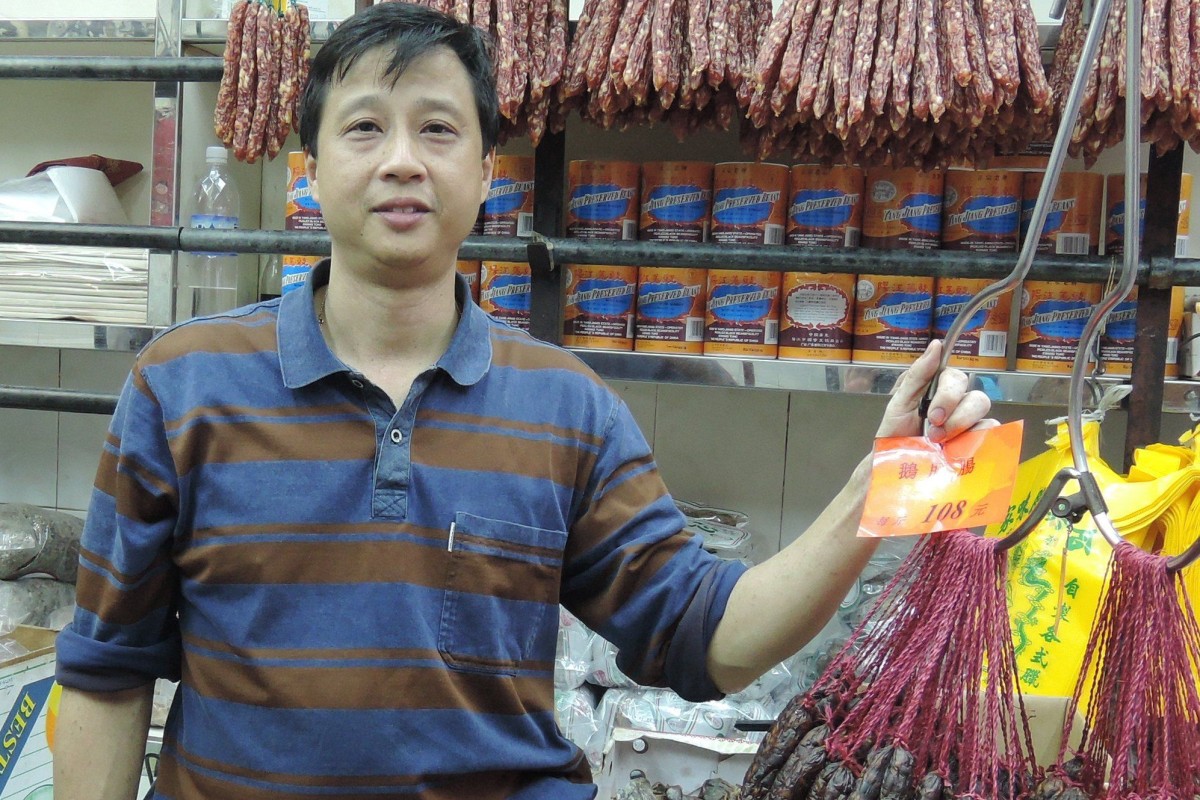
This story was part of Elephant Community Press' 2015 exhibition, "Beyond the Storefront".
Chan Wing Luen, one of the business partners of Hop Hing Preserved Food Limited, has worked in the industry for almost three decades, during which he has kept the traditions of preserved meat and made a living from it.
Wearing a shirt with blue and brown stripes and a pair of blue jeans, Chan sits calmly on a plastic chair elevated by cardboard and looks into the street. “Neither the shop nor the industry has changed much over the years,” he says.
Hop Hing, a shop on the old coast of Sai Ying Pun, clusters with many other similar shops, and the decoration of the shop is unbelievably simple: strips of Chinese sausages and roasted ducks hang down from the ceiling, brownish paper bags that are no longer in use lie on one side of the wall, and a simple desk amasses piles of record books, with historical photographs in between. Yet the shop is also incredibly neat and tidy, with a few staff members chatting with each other.
“The method of making Chinese sausages remains traditional,” he says. After the mixing of lean pork, the contents are put into casings, with the addition of the alcohol Fenjiu, and then the sausages are put into an oven to bake for nearly three days until all the water has evaporated. Then, they hang the series of sausages from seaweed and put them into a plastic bag.
Indeed the coming in of technology only replaces the mixing of meat by human efforts with machines, while the whole packaging still relies on manual labour; simple record books are adequate so even Excel is not required to do the accounting; and most of the ordering is still done by telephone calls from familiar customers.
Recommended to other potential customers by friends and neighbours, their shop is one of the time-honoured brands in the preserved meat industry. Pointing at the photograph featuring the visit of former chief executive Tung Chee-hwa to the shop, Chan remarks that the experience was not very special and that one day government officials just informed him that the chief executive planned a visit to his shop. But even if he considered it ordinary as he says, he smiles as he describes the hand-shaking experience with the former chief executive. “His hand was really smooth when compared to our rough hands,” he says. “Maybe we have done too much work .”
Chan entered the industry when he finished Secondary Three because he felt that he had no interest in studying. Coincidentally his father knew the boss of Hop Hing, so he came here as an apprentice, helping to support his not very well-off family. “It was a choice of life. I didn’t want to study, so I came here to work,” Chan says.
In recent years, he spends more time with his family than pursuing his own interests, especially with his daughter who is currently in Primary Five. Speaking of aspirations for the next generation, he puts an emphasis on interest. “It is good for youngsters to work in an industry that they are interested in,” he says. “Their motivation for studying will be greater. I don’t think my daughter will enter this industry because it is far too routine for youngsters.”
As for his own work, he says, “I don’t really know about the prospects of the job. All the things are determined by the market. If it allows, we will stay, and if it does not allow, we will decline naturally. But at least at the moment we can earn a living.”
Rising from the table, Chan continues to pick the sausages hanging from the ceiling, chatting with the long-time staff and regular customers.
